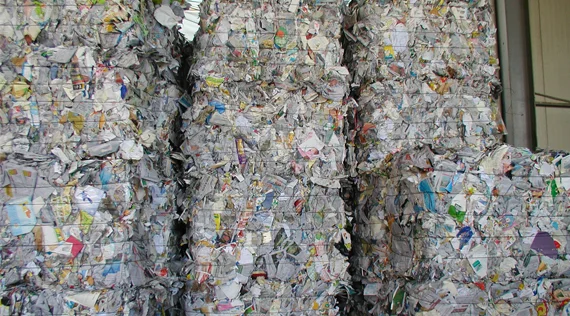
SEATTLE (Scrap Monster): Decades ago, we got into a bad habit. We got the idea in our heads that plastic was so cheap to make that it didn’t seem to matter how many plastic bags, bottles, drinking straws and countless other items we used once and threw away.
The problem is that most plastics take a long time to decompose. Plastics in use today, from disposable diapers to Styrofoam coffee cups, will linger long after we become dust. These plastics are estimated to take some 500 years to break down.
The scale of the problem is both vast and complex. More than 400 million tons of plastics of all different kinds, equivalent to the weight of more than 40,000 Eiffel Towers, are produced globally each year. About 8 million tons of this waste winds up in the ocean. At the current rate, some experts predict that by 2050, there could be more plastic than fish in the ocean by weight.
At the Center for Plastics Innovation (CPI) at the University of Delaware, researchers are making scientific breakthroughs essential to reducing plastic waste. The center is led by LaShanda Korley, Distinguished Professor of Engineering at UD. Thomas H. Epps, III, the Allan and Myra Ferguson Distinguished Professor of Chemical and Biomolecular Engineering, serves as deputy director.
Initially funded four years ago by the U.S. Department of Energy as one of the nation’s Energy Frontier Research Centers, CPI has now been awarded over $14.5 million in renewal funding to continue its mission to develop scientific tools and processes to deconstruct and upgrade plastic waste, transforming it chemically into something valuable to keep it out of landfills or elsewhere in the environment, and to develop new polymers that are inherently recyclable.
“Congratulations to Professors LaShanda Korley and Thomas Epps and their entire team at the Center for Plastics Innovation for the progress they are making to address this critical challenge facing the sustainability of our planet,” said UD President Dennis Assanis. “We applaud the pioneering accomplishments that already have been made and wish this exceptional team, and all of its partners, continued success with their work ahead.”
As an Energy Frontier Research Center, CPI is bringing a fresh focus to the global problem of plastics waste, seeking the balance between meeting demand for lightweight, resilient materials, while also thwarting the environmental threat of plastic pollution.
The research team includes experts at UD, University of Chicago, University of Florida, University of Pennsylvania, Oak Ridge National Laboratory, and University of North Carolina at Chapel Hill.
“What is unique about the Center for Plastics Innovation is the convergence of expertise in polymer chemistry and engineering, catalysis, materials science, enzyme engineering, computational modeling, advanced manufacturing and data science,” Korley said. “The center’s strength is taking a systems-level approach to the entire plastics paradigm.”
Plastics are inherently complex. “There’s no ‘one size fits all’ approach to the global problem of plastics pollution,” Korley said.
Many kinds of plastics are manufactured around the world, all with different molecular structures — from the polyethylene terephthalate (PET) used in water bottles, to the polyvinyl chloride (PVC) for making drainage pipes and many other materials.
Different production processes are involved in making each kind of plastic, and an array of additives may be used to increase durability, flexibility, fire resistance and other qualities. Each plastic also may behave differently at different temperatures, pressures or exposure to chemicals.
When the plastic is tossed away for recycling, there is the additional challenge of dealing with whatever material the plastic may have bottled, contained or otherwise commingled with.
CPI is developing a comprehensive strategy to valorize diverse plastics waste streams and enhance circularity in the plastics life cycle — keeping plastic items in longer use where possible, then recovering and reusing that plastic for valuable things like lubricants. The center is driving the new frontier of plastics sustainability.
“One of the most distinctive aspects of CPI is its ability to deal with real-world problems and advance scientific frontiers through molecular-level understanding,” said Dion Vlachos, Unidel Dan Rich Chair in Energy, who co-leads the center’s research thrust on complex waste. “It is one of the centers whose science would significantly impact the environment and our society. We are excited to continue to host the center and work with many talented researchers across academia and industry.”
Courtesy: www.udel.edu



| Copper Scrap View All | |
| Alternator | 0.40 (0) |
| #1 Copper Bare Bright | 4.17 (-0.03) |
| Aluminum Scrap View All | |
| 356 Aluminum Wheels (Clean) | 0.81 (0) |
| 6061 Extrusions | 0.71 (0) |
| Steel Scrap View All | |
| #1 Bundle | 360.00 (0) |
| #1 Busheling | 380.00 (0) |
| Electronics Scrap View All | |